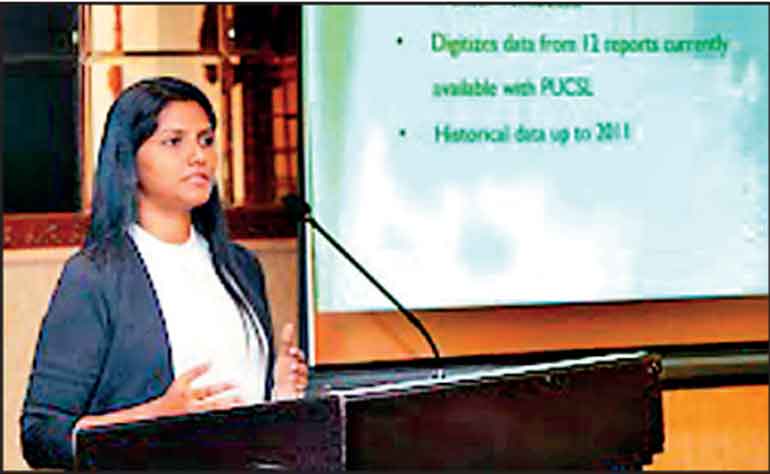Sunday Feb 22, 2026
Sunday Feb 22, 2026
Saturday, 2 December 2023 01:19 - - {{hitsCtrl.values.hits}}

Sri Lanka Energy Program Tariff Analyst/Power System Specialist Punsara Nagasinghe explains how to use the new Dispatch Data Dashboard during the launch event
The United States Agency for International Development (USAID), in collaboration with the Public Utilities Commission of Sri Lanka (PUCSL), launched the Electricity Dispatch Database and Dashboard, an online platform to enhance transparency in the management of Sri Lanka’s power distribution through a visualisation platform.
Developed and funded by USAID’s Sri Lanka Energy Program, the Dispatch Data Dashboard is a comprehensive tool that allows stakeholders to access and visualise data relevant to electricity generation, forecasts, costs, reservoir details, and emissions, providing insights into the energy sector’s intricate operational dynamics. The initiative will help foster transparency and accountability within Sri Lanka’s energy.
The Dispatch Data Dashboard features a user-friendly interface, making it accessible to a broad audience. Users will be able to query dispatch data, gaining valuable insights into the dispatch process and the rationale behind cost optimisation. This transparency not only promotes accountability but also encourages collaboration among industry players, paving the way for improvements in the dispatch process.
The Dispatch Data Dashboard will be used for a wide array of stakeholders, including sector analysts, researchers, current independent power producers, future renewable energy developers, and environmental organisations. The online dashboard is available at https://gendata.pucsl.gov.lk/home.
The USAID Sri Lanka Energy Program is proud to be at the forefront of this initiative, driving positive change for the benefit of all stakeholders. Members of the public will now have the ability to comprehend the dispatch process, enabling them to raise inquiries and contribute to discussions about the energy sector’s future. This marks a significant step forward in democratising information and fostering a sense of ownership among the public.
USAID Economic Growth Office Director Chris Powers said: “This Dashboard will help drive financial sustainability of the power sector, while contributing to the viability of the nation by enhancing energy security and ensuring the lowest possible cost of electricity. By fostering transparency and empowering stakeholders, this tool is an instrumental resource in our collective fight against climate change. In understanding and optimising our energy management processes, we pave the way for a more sustainable future, driving efficiencies that contribute to reducing the cost of power generation while reducing our carbon footprint. In the face of climate challenges, knowledge is power, and the Dashboard empowers us all to make informed decisions that positively impact our environment.”
“The Dispatch Data Dashboard represents a major leap towards a more transparent and accountable energy sector in Sri Lanka,” said PUCSL Chairman Professor Manjula Fernando. “By providing a platform for stakeholders to engage with dispatch data, we aim to drive positive change, encourage innovation, and ultimately contribute to a more sustainable and cost-effective energy future for Sri Lanka,” Chris Powers added.
The Dispatch Data Dashboard is anticipated to play a crucial role in driving down generation costs for the Ceylon Electricity Board (CEB). By facilitating a better understanding of the dispatch process and encouraging stakeholder collaboration, the initiative holds the potential to bring about operational efficiencies that will benefit both the industry and end consumers backed by the National Energy Benchmarking Portal – which was recently launched by the USAID Sri Lanka Energy Program and the Sri Lanka Sustainable Energy Authority to address the demand/consumption side of the energy.
The USAID Sri Lanka Energy Program supports transforming Sri Lanka’s power sector into a market-based, secure, reliable, and sustainable system by mobilising investment to deploy advanced technologies, increase flexibility, and enhance competitiveness.